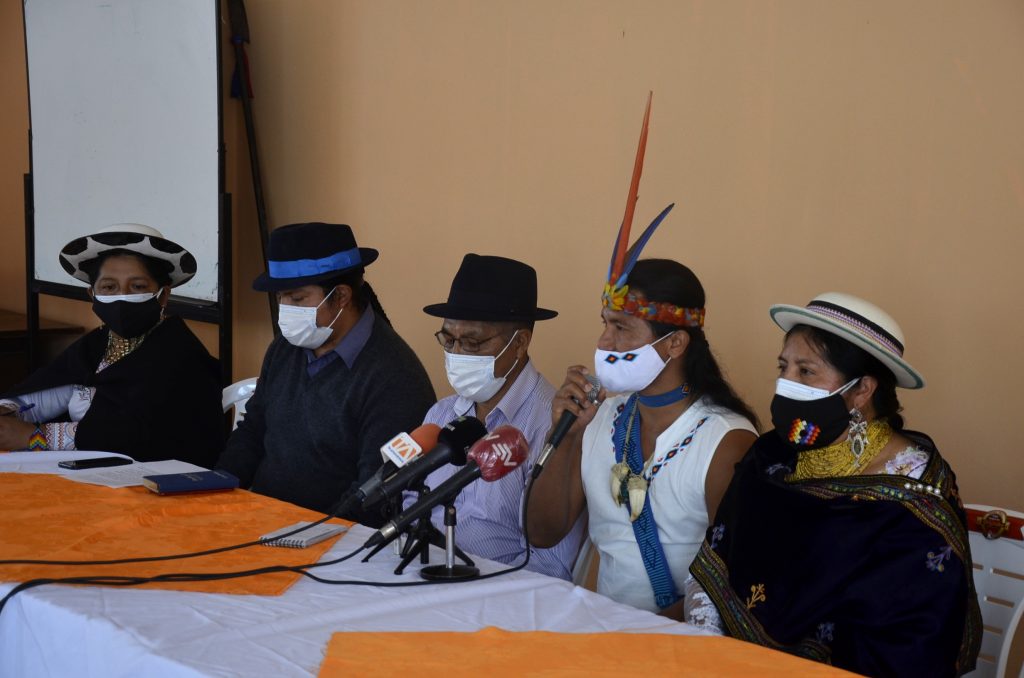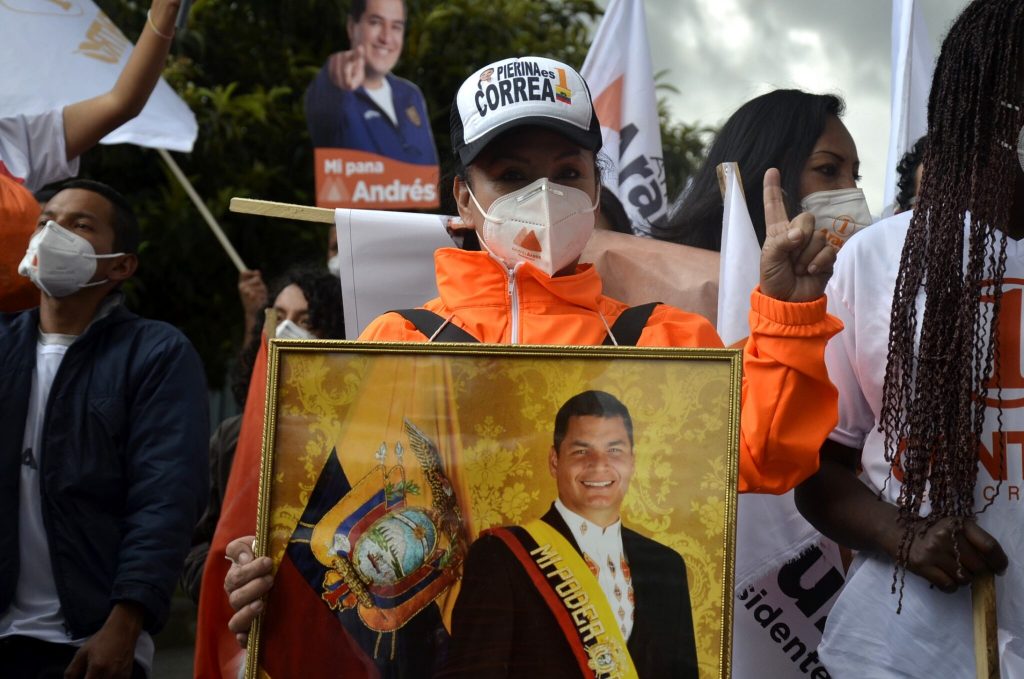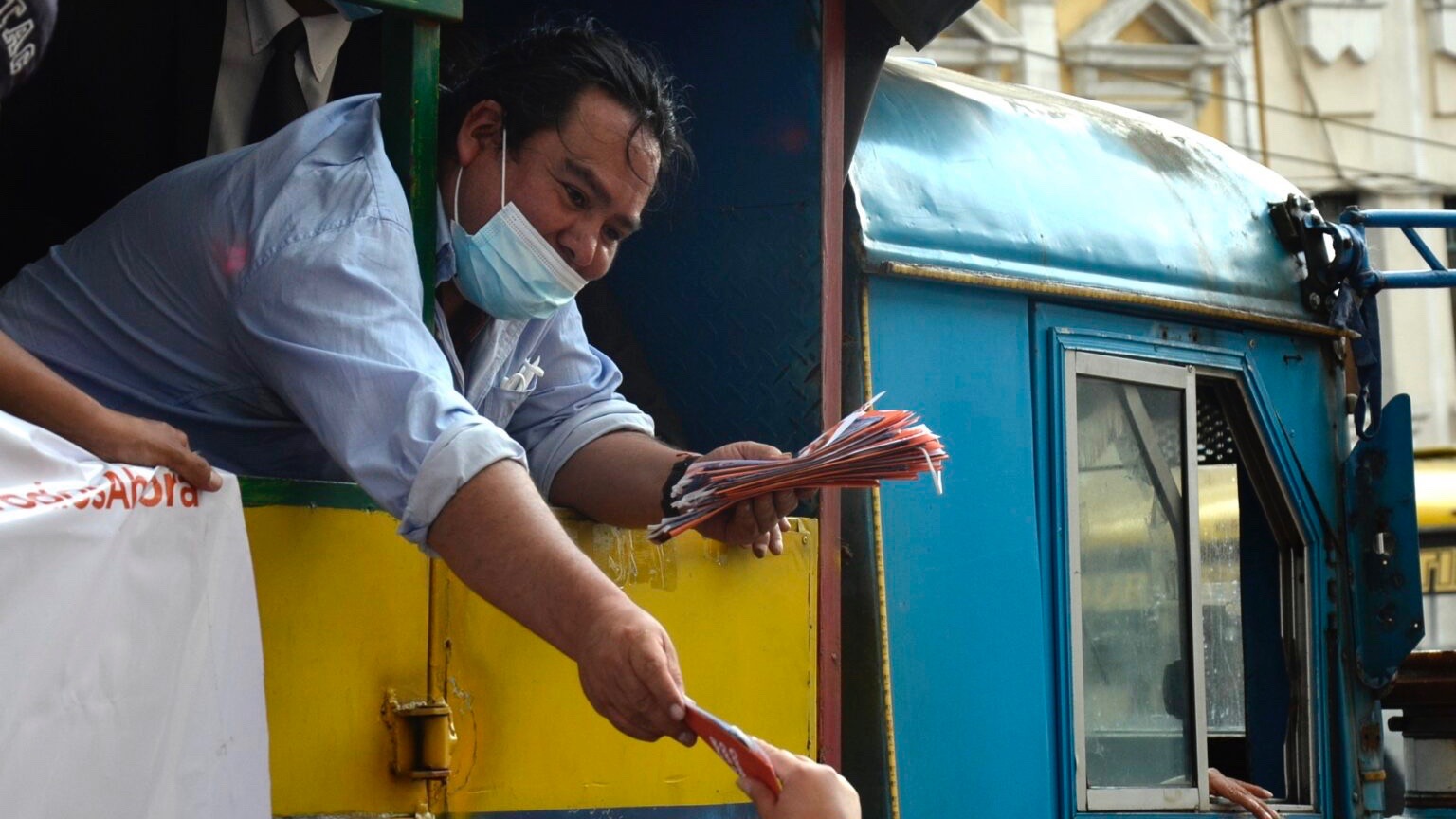On Sunday, April 11, the people of Ecuador will elect their next president. The election takes place amid an escalating pandemic, divisions and polarization in the Indigenous movement, and fears of electoral irregularities
Some of the key issues are the economic crisis, the proposals of privatization presented by the president Lenín Moreno, and the complete mismanagement of the pandemic, including the delays in vaccination.
On April 2, the Committee of Emergency Operations decreed seven days of curfew and a state of emergency. Amid the restrictions on mobility and large gatherings, the candidates, young economist Andrés Arauz – who is carrying on the legacy of Correísmo – and the banker Guillermo Lasso – who has espoused neoliberal policies – concluded their respective campaigns on Thursday.
The concluding events were held in the cities that each had lost in the first round. Arauz brought together several thousand people in the Cumandá Cultural Center in the capital Quito, where Lasso bagged over 3% more votes than him in the first round in February.

Lasso organized a rally at the Simón Bolívar peer in Guayaquil, his hometown and the capital of the Guayas province. Here Arauz won an important victory in February, with a 16% lead over his rival. He also was the frontrunner in the coastal provinces of Esmeraldas, Manabí, Los Ríos, El Oro, Santo Domingo de los Tsáchilas and Santa Elena.
While the coastal region supported Arauz’s progressive Union for Hope, the Sierra and the Amazon, while less densely populated, went to the Indigenous candidate Yaku Pérez of the Pachakutik Plurinational Unity Movement. The Pichincha province, where Quito is located, was the only province that favored Guillermo Lasso.
While Arauz won the first round with 13% more votes than Lasso, the more than 3 million votes obtained by Pérez and Xavier Hervas (of the Democratic Left party who came fourth) will tip the balance, considering that just over 10 million people voted in February. Particularly decisive will be the votes from the Azuay province (former bastion of Correísmo), the peripheral regions of Quito, the Sierra and the Amazon regions, and the youth, urban, women and professional “liberal” voters that liked Hervas.
The polls, Indigenous vote and social movements
To date, the majority of the pollsters indicate that the Andrés Arauz-Carlos Rabascall ticket will win by a 4-5% margin over Lasso. The independent research project, Independent Electoral Calculation, said that in terms of voter preference, Arauz leads by 4.8%. The consulting firm predicts a 68% chance of Arauz winning. The number of undecided voters has come down but still hovers around 25-39%, according to the majority of polls. Prominent among these undecided voters are the youth.
According to official statistics, Indigenous people and all of the “peoples and nationalities” constitute 7% of the population. Why then is the Indigenous vote so decisive? In addition to the close electoral contest, it is important to point out that this sector of society has great national prestige after its role on the front lines of the social uprising in October of 2019. The uprising took place in response to the paquetazo, a series of neoliberal policies “recommended” by the International Monetary Fund and imposed by the famous “Executive Decree 833” by the government of Lenín Moreno.

A chunk of the urban population, which is middle class and progressive, will make its decision based on the leanings of the principal Indigenous federations of the country. Indicative of this is the historic 19% that Pérez won in February on the Pachakutik ticket, which is the electoral instrument of the Confederation of Indigenous Nationalities of Ecuador (CONAIE).
However, the Indigenous movement is much more complex and diverse than it would seem at first glance, and especially so in this polarized political situation. Some national federations like the FEI and FENOCIN have already expressed their political support to Arauz’s Union for Hope ticket. And in an act that generated a great deal of buzz, the president of the CONAIE, Jaime Vargas, publicly declared his support to Arauz along with various leaders of organizations from the Indigenous Amazon region. However, the national board of CONAIE reiterated its position of a “blank ideological vote”, and could end up kicking out Vargas in its next assembly. However Vargas was not the only one that did not follow the organization’s decision. Pérez’s vice presidential candidate, Virna Cedeño, shared a video on social media where she expressed support to Guillermo Lasso.
Meanwhile, Vargas and other key leaders like Leónidas Iza have talked about the capture of Pachakutik by sectors of the “Indigenous right,” as well as the imposition without consultation of Pérez as the candidate of the movement. According to the economist and professor Pablo Dávalos, the rupture between the bases and structures of the CONAIE with Pachakutik took place a while ago. The organization is believed to have accepted the candidature of Pérez in the first round to avoid divisions.
National Electoral Council: from lawfare to fraud?
After months of persecution, the banning of the leader of the Citizen’s Revolution and former president Rafael Correa from political participation, and the veto on registration of various political parties, finally Correísmo was able to formalize its registration in the electoral process on October 2 2020, through the legal representative from the Democratic Center party.

The key tool of this lawfare was the National Electoral Council (CNE) which has been harshly criticized for its role in the first round. It hurriedly released a preliminary report before the electoral trends were clear and created suspicion and doubt about who would compete against Arauz in the run-off.
The five principal members of the CNE were appointed respectively by Pachakutik (CNE president Diana Atammaint); the Creo Movement (vice-president Enrique Pita); the Social Christian Party (José Cabrera); the ruling Alianza País party (Esthela Acero); and FUNDAMEDIOS (Luis Verdesoto). Fundamedios is an organization representing the major media corporations in the country. Thus, all of the members of the CNE represent parties, sectors, or interests that are opposed to Correísmo.
To add doubts, on April 8, Argentine journalist Marco Teruggi published an article quoting a source from CNE that warned of a plot to commit electoral fraud, which would supposedly take place on the day of the election. The anonymous informer indicated that Lasso himself was politically responsible along with his ally Jaime Nebot of PSC. According to the report, the plan would be carried out in the polling stations and in the center of digitalization, and would be based on the fraudulent use of 600,000 ballots that were printed “by accident” in the first round and not declared. According to this source, the combination of diverse irregular methods would modify the final result to the extent of 1.3-1.5 million votes.





